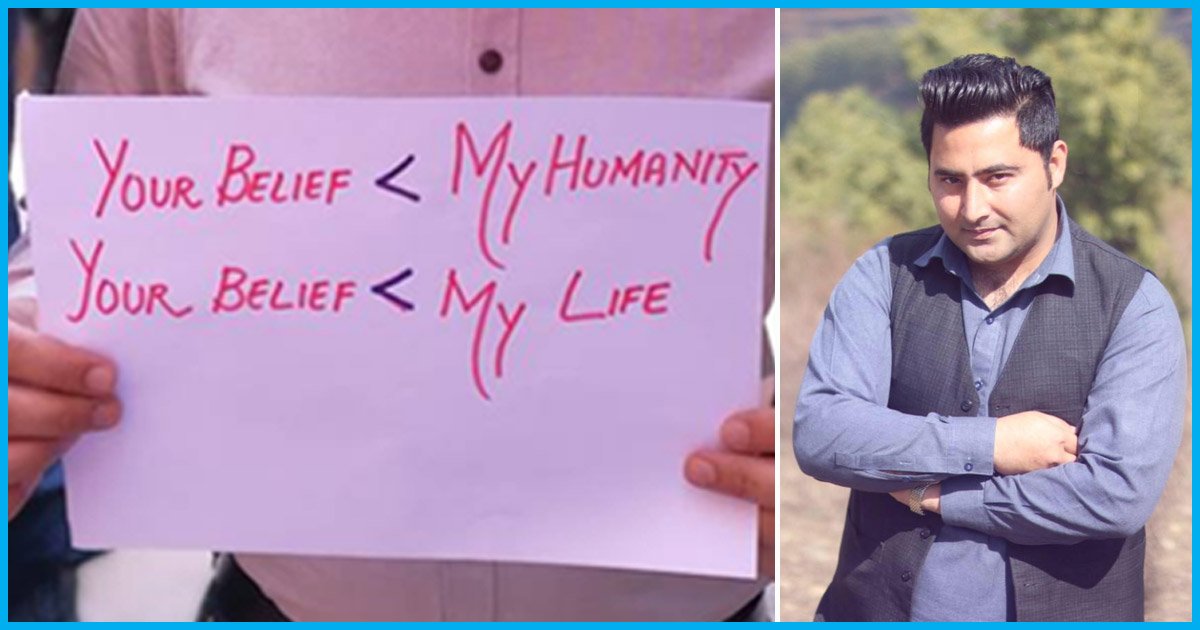Shumaila Hussain Shahani, 23, lawyer, activist, and Founder-President of the All Pakistan Feminist Alliance has started the #BolneDo campaign by posting on social media a photo of her holding a finger to her lips symbolising the suffocation and silence imposed on her and others by fundamentalist elements in her country. Hers is a passionate voice which lays emphasis on the fact that the need for listening to differing opinions is desperate as there is a possibility that the laws (Blasphemy law) that are justified in the name of Islam may itself be blasphemous as it is going against the spirit of Holy Quran.
A residue of the colonial legacy of divide and rule, blasphemy laws have been a part of the penal code of Pakistan (and India). These laws have been used time and again as political weapons by the corrupt and the venal against individuals who dare to question the status quo. Often, blasphemy laws are used as a cover for matters that should not ideally be related to one’s faith.
On email correspondence with The Logical Indian, Shumaila elaborated on how her own values and deep religious beliefs enabled her to stand up and ask for an open, peaceful discourse not tainted by ignorant hatemongers who love to throw labels like the “American agenda”, “Israeli agenda”, “Indian agenda” and so on to curb any attempt to openly discuss and understand the Quran. On her Facebook posts, she highlights different verses from Quran which talk about peace and how Allah has repeatedly told Muslims to ignore and avoid any mocking or insults thrown at the religion because Allah is enough for them and those who mock today may understand the message of love and peace (and even feminism, gender justice, nondiscrimination etc.) and become better individuals.
She started this campaign on 17 April, four days after the public murder of Mashal Khan. More and more people are joining Shumaila’s cause by putting up photos holding a finger to their lips and using the hashtag #BolneDo on their posts and expressing support for Mashal Khan.
The Murder of Mashal Khan
The recent incident, where a bright, free-spirited journalism student, Mashal Khan, was brutally beaten to death in his own university by his own friends was presented to the public as a manifestation of anti-Islam sentiments. This was perhaps a blatant cover-up by the university administration. He was also on hunger strike against corruption in university administration.
Misuse of Blasphemy Laws: Not An Isolated Incident
The blasphemy laws were moulded into a tool to silence political opponents by the military dictator Zia-ul Haq between 1978 and 1986.
Blasphemy laws are contained in several sections of Pakistan’s Penal Code and are usually limited to punitive measures or some jail time but Section 295-C states “Whoever by words, either spoken or written, or by visible representation or by any imputation, innuendo, or insinuation, directly or indirectly, defiles the sacred name of the Holy Prophet Muhammad (peace be upon him) shall be punished with death, or imprisonment for life, and shall also be liable to fine.”
The option of life imprisonment was removed after a 1991 Federal Shariat Court judgement. Basically, the punishment is the death penalty. Though the state is part of it, the sentence is often carried out by a fanatic mob. A good number of these cases have also been registered against Muslims but the proportion of minority populace charged under it is quite disproportionate as non-Muslims make up only 3-4% of the population of Pakistan. Few leaders have condemned these laws time and again but fundamentalist Islamic groups have prevented any amendments. In practice, these laws are used to settle personal scores and unfairly target minorities and silence anyone who dares to voice their opinion.
The Governor of Punjab province of Pakistan, Salman Taseer, was gunned down by his own bodyguard in 2011. The bodyguard claimed it was his religious duty to kill the minister, who was an outspoken critic of Pakistan’s harsh blasphemy laws and supported liberal reforms.
Junaid Hafeez from Rajanpur, Pakistan, is a Fulbright scholar. He was serving as a visiting lecturer at the English Department of Bahauddin Zakariya University in Multan. In 2013 he was accused of blasphemy by the students of the extremist Islami Jamiat Tulaba and Tehrik-Tahafuz-e-Namoos-e-Risalat groups. Consequently, he was expelled from the university and arrested by Pakistani authorities. A case was registered under Pakistan’s blasphemy laws and Junaid has since been rotting in a Multan jail. His first defence lawyer, Mr Rashid Rahman, was gunned down by extremists for merely taking up his case.
Recently, a person named Papu Baloch and his organisation Saathi Filaahi Tanzeem used blasphemy laws to harass doctors who were hosting the first National Conference of Doctors in Tando Mohammad Khan city just because one of the organisers was a Hindu.
There are many more incidents where these laws hav…











